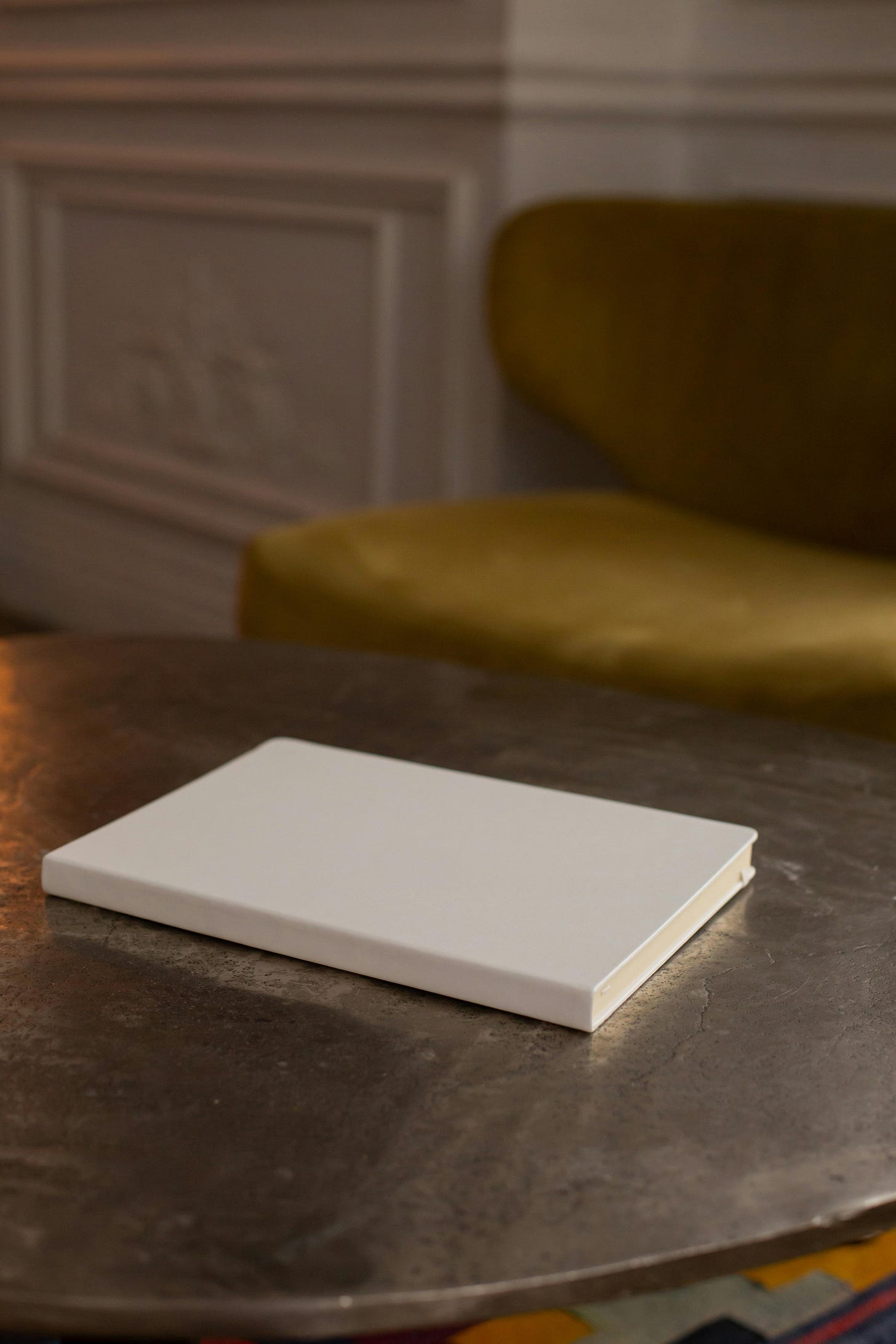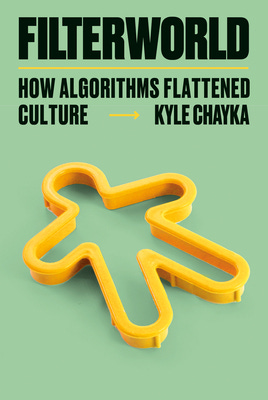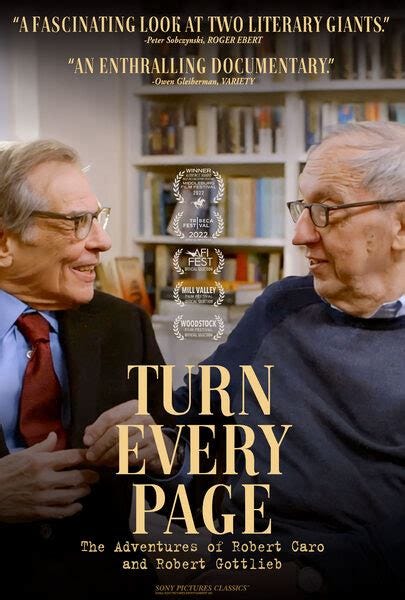I don't want to write a flattened book
Algorithms, influences, and finding juicy inspiration in the "flattening" culture

This week I finished listening to the audiobook Filterworld: How Algorithms Flattened Culture by Kyle Chayka. It was a thought-provoking listen, and it got me thinking about the book world (which he does address a little in the book.)
Chayka wanted to explore how algorithms are now shaping culture, and how, because of the nature of algorithms (which are designed to get the most people engaged for the longest amount of time), they naturally filter toward either the most emotionally-charged content (which we’ve seen in our political landscape, getting people’s views to be more divisive and extreme) or they skew toward the most palatable/generic content (the Instagram photo of a serene table and a fiddle leaf fig plant.) Luckily, this book wasn’t about politics and was instead about the latter issue—the flattening of culture and taste.
The flattening
He first noticed this flattening as he traveled around the world to all these interesting and diverse cities. When he looked up coffee shops, there was always the coffee shop that fit the Instagram aesthetic—white subway tiles, Edison bulbs, plants, natural wood, etc. Travelers wanted the sameness instead of exploring a shop unique to the place.
After that, he started to notice this in all kinds of different cultural arenas. New poets that got attention were ones whose work was easily turned into easy-to-understand quote graphics or Instagram posts. Movies were often of the big Marvel variety where online-friendly, high-action clips could be posted and shared.
Discovering new music got harder because apps like Spotify just recommend more of the same type of thing we already listen to so we don’t explore. Same with Netflix and its recommendations. And, of course, now everything including culture has a rating system—likes, hearts, stars, tomatometers—so that we can save ourselves the trouble of exploring for ourselves or, God forbid, waste our time on something with less than 4 stars or 50% Rotten Tomatoes.
So inevitably, I ended up thinking about how this impacts books. Books are culture, so if algorithms are creating a flattening of culture, is that happening to books as well?
Are we as authors going to be influenced (consciously and subconsciously) into writing books that are the equivalent of subway tile and a fiddle-leaf fig plant? The ones that most neatly align with the algorithm? The ones that are…fine.
This isn’t about tropes
First, I want to be careful here and clarify that I'm not talking about tropes. Romance, like many other genres, has tropes. But tropes leave endless amounts of space for creativity within them. Tropes can provide the comfort of recognition without limiting a story too much.
Tropes don’t scare me. I love tropes. What I am afraid of is writers feeling like we can't surprise or challenge our readers with things that don't fit as neatly into a box or the current hot trend.
Or, if we as creators only consume what the algorithms are feeding us for our inspirational input, our books may naturally start to curve toward the mean. (I think that's the right term. Please don't make me remember math!)
For instance, since everything is boiled down to a number/rating now, what if we only read books that algorithms have fed us and that have a 4-star or above rating? Or only watch movies with a Certified Fresh Rotten Tomatoes rating?
I'm not saying those books or movies aren't good. (Most of my own books are rated 4 stars or above on average. Thanks, readers!) But when we only use that metric, we're missing great stuff that could challenge us, surprise us, or spark fresh ideas.
Because if a book has 3-point-something star average, many of us would think, well, that one must be a dud. However, (oh hell, here comes math again. My teachers were right! I would need it!) if a book has a ton of 5 stars and a ton of 1 stars, well, that's a 3 average. (fancy math there, kids) But that doesn't mean it's a bad book. It means it's a divisive book.
A divisive book usually means the author did something interesting and some people are going to love that and others will hate it. But in both cases, it caused a real reaction, a real feeling. Not an oh this was fine.
Books that stir up feelings
For instance, let’s use the book I Have Some Questions for You by Rebecca Makkai as an example. This was one of my favorite reads of last year. I gave it 5 stars. But when you look at the rating, it sits at 3.63 stars on Goodreads and there are a lot of ones. One-star reviews that say things like "this was a mess" or "warning: rant ahead." Others gave it 5 stars and are singing its praises.
Why? Well, because the author took risks. This is a literary fiction author whose last book (about the AIDS crisis) was a finalist for the Pulitzer and the National Book Award. This time she decided to tackle the topic of true crime and podcasts. She did not write it like a thriller. It was a literary suspense that raised some questions about how we treat the subject of true crime. It made me think. It challenged and surprised me (what art is meant to do).
So, it was a favorite for me, but I understand the 1 stars too. Genre thriller readers didn't get a thriller. High-brow lit fic readers got some salacious crime and dark academia mixed in with their book about a big topic. It didn't fit neatly in a box. It was different. It was what the author was inspired to write, algorithms be damned. Her two books would not sit next to each other on the shelf if not for her name. And I’m not a big thriller reader or a big high-brow lit fic reader, so why did I pick up this book?
I chose the book because instead of relying on algorithms or ad-paid "products related to this item" recommendations or Goodreads averages, I went to my "curators."
Curators
Over the years, I've sought out reviewers and sources whose recommendations I trust and whose tastes often align with mine. And usually my taste doesn’t whole-heartedly align with any one source. I’ve never found a true “book twin”, but I can Frankenstein my twin. :)
I know, for instance, that I like Anne Bogel of Modern Mrs. Darcy’s non-fiction picks, but our fiction tastes only align in certain genres/subgenres. I know that Sarah of the Sarah’s Bookshelves Live podcast doesn’t usually like romance but many of her other genre picks (like crime fiction or “messed up love stories that are not romances”) work for me, and our non-fiction tastes line up almost perfectly. On the Currently Reading podcast, I know that the two hosts provide me with different things. The Ezra Klein podcast will give me non-fiction books that will make me think deeply about something. I value these sources tremendously. I pay for Patreon content from all of them except Ezra.
For movies, I subscribe to services like The Criterion Channel which has human curators who come up with fresh playlists each month. Here’s a taste of February’s themes on Criterion. Fun, right?
For music, I do things like work my way through curated lists like Rolling Stone’s 500 Greatest Albums of All Time, listening to whole albums with the songs played in order so that I get the full experience.
And yes, I know that the people who are acting as curators are also being influenced by algorithms, but I still think it leaves more room for surprise and discovery.
I want the interesting stuff. I want the messy, non-algorithmic inspiration to put into the writer engine. Because as a reader, I can feel that—when a writer brings something fresh to the table—and I want to be that type of writer.
I know part of this is because I’m what Becca Syme calls a Trailblazer Archetype author. In Clifton Strengths, my number one strength is Learner, so if I’m not learning, I’m not happy. Finding new inspiration and trying different things are versions of learning for me.
But I don’t think you have to be a trailblazer type to benefit from stepping out of the algorithm river for a minute and looking for some fresh inspiration.
So, how do you do that?
Stepping out of the algorithm river
1. Find your curators
This can take time, but it’s a fun exploration. Your curators may turn out to be your friends, a coworker, a podcaster, a bookstagrammer or booktok reviewer, a blogger, a big book review site, a celebrity book club, another author. Who knows? It’s good to find a combo of sources that you can quilt together so you get a variety of perspectives. Same goes for finding movies or music.
2. Pick a movie or book at random (just because it sounds interesting to you) and don’t check reviews or ratings before you jump in
The library is great for this because you don’t have to commit money to take some reading risks. And if you have any streaming services, this is easy enough to do for movies or TV shows. Just instead of looking through your suggestions, type in a random letter or word into the search and scroll through the list that comes up.
3. Look inward and truly dig into the question of What do I really like? vs. I like it because it’s the thing people are buzzing about right now and I’m seeing it everywhere
Filterworld had me questioning things like, wait, do I really like minimalist style because that’s my style or is it because that’s the Instagram aesthetic??? *cue existential design crisis* lol.
4. Be curious when you don’t like something, especially if lots of other people are liking it (and vice versa—liking something that others don’t.) This can help tease apart your own personal taste.
And knowing your nuanced taste can help you find some of those unique things that can flavor your own writing. For instance, I’ve learned that I don’t like romances with big misunderstanding plots or instalove. That has influenced my books. In reviews, I’ll often see readers pointing out that “these characters actually talk things out with each other!” so avoiding the misunderstanding plot gave me a little piece of my “brand.”
5. Challenge yourself to try a book or movie every now and then that you don’t think would be your thing.
Being in a book club serves this purpose for me. I would’ve never picked up Demon Copperhead on my own (a giant lit fic, Pulitzer-prize-winning book based on David Copperfield but set in Appalachia and the opioid crisis? Um, no thanks) but I ended up liking it a lot.
Even something that you don’t like can turn out to be inspiring.
Alright, I’m going to wrap this up because wow, it’s gone long! :) I’d love to hear your thoughts on this. Do you feel like culture is flattening? Do you see this playing out in your own life at all?
But one last thing, I have a curated pick for you!
A curated pick
Turn Every Page: The Adventures of Robert Caro and Robert Gottlieb (streaming on the Criterion Channel and available for rental on most other platforms)
This documentary was an absolute delight. It’s about writer Robert Caro (who wrote The Power Broker and the ongoing Lyndon Johnson biographies) and his editor Robert Gottleib (who has edited a stunning list of great authors) and their relationship as they’ve worked together over the decades.
Y’all, this was such a feel-good love letter to writing and doing your best and passion projects/life’s work. I loved every minute of it! Plus, there were great little wisdom nuggets scattered throughout.
For instance, Gottleib said the measure of a great book is when you read it and you don’t want it to have more and you don’t want it to have less. Love that. (And it’s such an editor thing to say.)
I was smiling the whole time. I love seeing people be really excellent at their jobs and having a deep love for what they do. It also shows that having passion can keep you young because both of these guys were in their 80s when this was filmed and were still working. Sadly, Gottleib passed away recently, but he left behind a great legacy of books.
If you want to feel good about the written word, check this one out.
Okay, now I’m really going! Thanks for reading if you made it this far! I’d love to hear if any of this stirred up any thoughts for you. :)









I miss the days of wandering through the book stores before Amazon, Goodreads, etc. Or even the grocery, dollar, or drug store. Discovered a few gems that way. The music stores with the headphone listening stations. The friends with the overflowing binders of CDs. Individualization is in my top 10 strengths so I appreciate uniqueness. I'm not liking the current trend of books listing out all the tropes and microtropes. It has enemies-to-lovers, one bed, he falls first, etc.! I might like all those tropes, but it also takes away the mystery. I can get from the blurb the trope. I want discover everything else along the way. There was a post on Reddit the other day of a book title "When Grumpy Met Sunshine" and how absurd it's getting.
Thanks for the thoughtful ponderings. I'm currently listening to an ARC by a much-acclaimed writer and hating it. Would my opinion change if I took a peak at the other early reviews on Goodreads? I don't know, but I hope not. I loved both of Rebecca Makkai's books and have learned to trust authors like Kristin Hannah--whose topics (the dustbowl? really?? Vietnam?) often make me want to run in the opposite direction. Yet when I come to the end of one of her novels, I mourn. (I got an early copy of THE WOMEN. Incredible.) And then there's the fact that there's so very much out there, that even with the most careful curating and choosing, we're going to miss a diamond and waste time with a flashy piece we regret. And as for writing: here's to resisting the flattening.